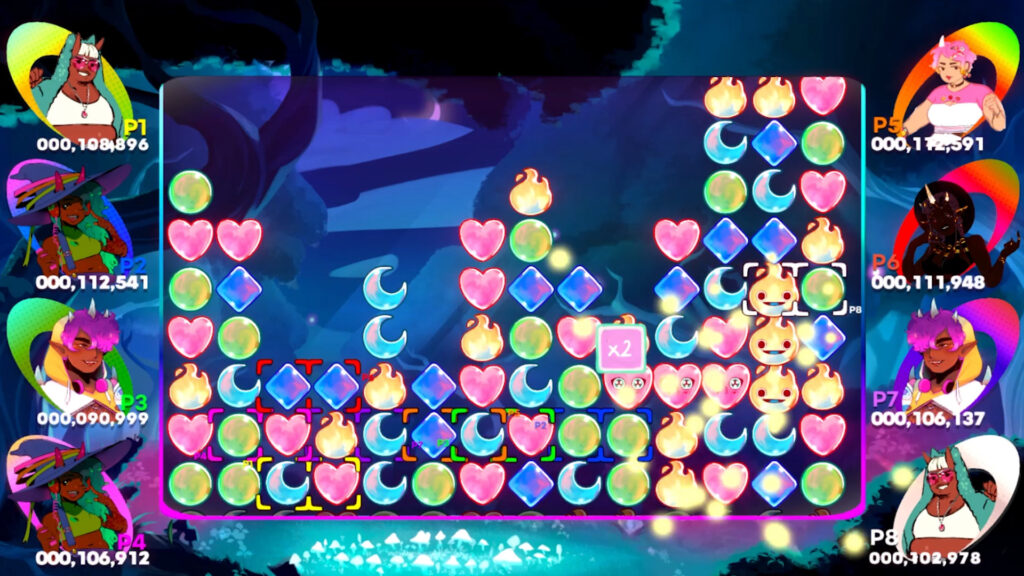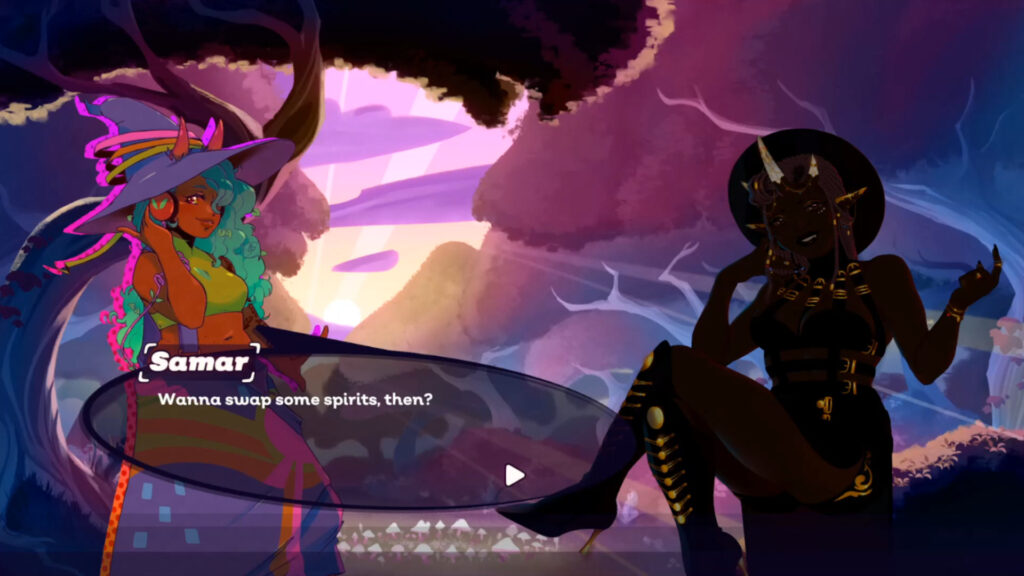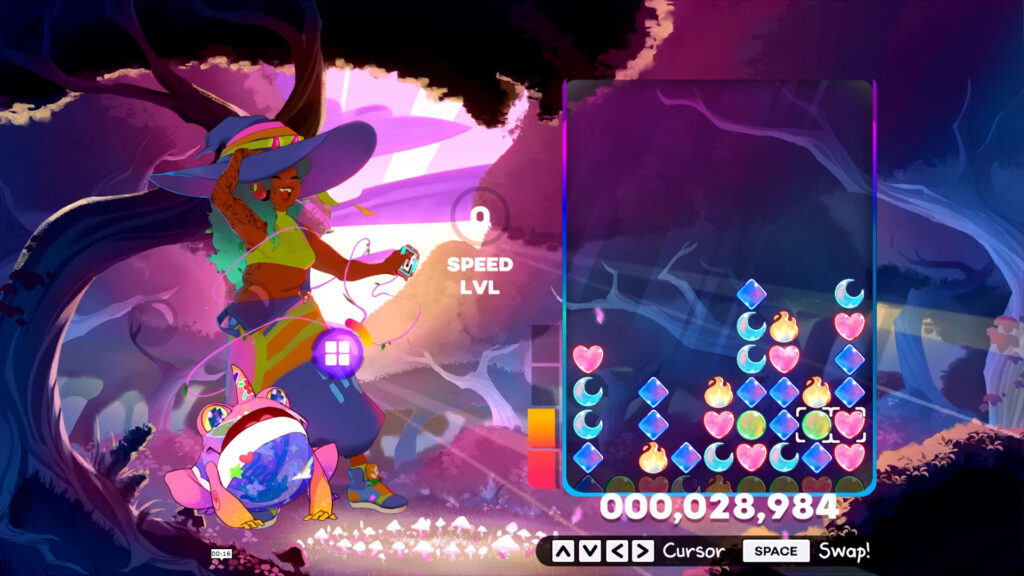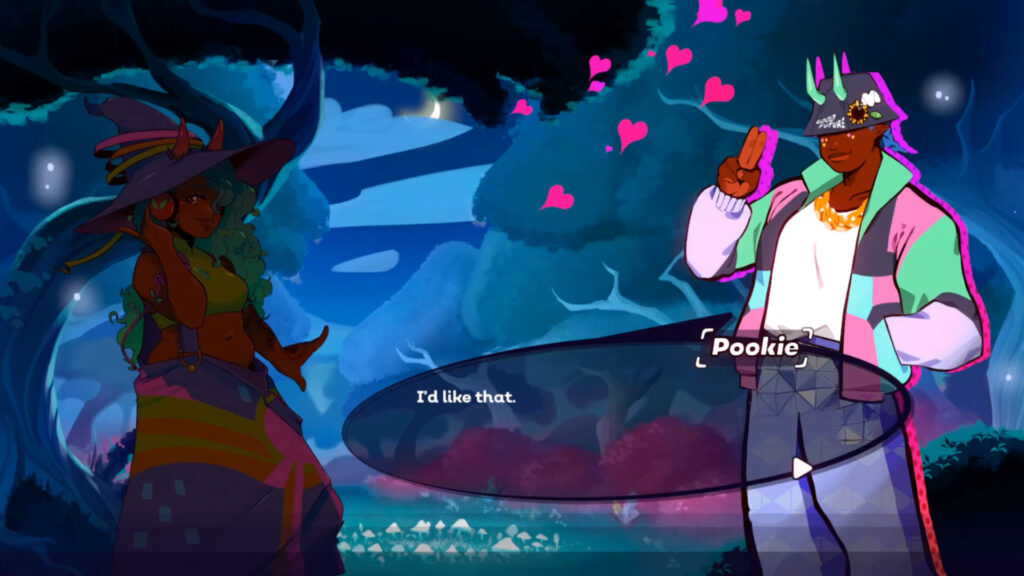
Spirit Swap is a game that celebrates black, PoC and queer joy
By now readers should be well aware of Soft Not Weak’s Spirit Swap: Lo-Fi Beats to Match-3 To, which was recently shown during E3’s Wholesome Direct. It’s a queer Match-3 game made by the queer, PoC owned stuido, Soft Not Weak. As soon as I heard those Lo-Fi grooves and saw the lush visuals my queer heart fluttered, so I was incredibly happy to talk more about the game with Jenny Windom, – she/her, Lead Producer + Community Development – Alex Abou Karam – they/them, Creative Director – and Morgan Lavelle – she/they, Lead Programmer.
“The real inspiration for Spirit Swap is actually the SNES Japan classic Panel de Pon. It was brought to North America as Tetris Attack and later spawned Pokemon Puzzle League, but none of the games that made it over here had that girly sparkle fairy charm that Panel de Pon had, or the vibrant characters.” Alex clearly knows what they want from a game, and let’s be honest, who doesn’t want some more sparkle, fairy charm in their lives? In a gaming world where queer stories are often bleak and traumatic, Alex wanted “the colors, the magical world, the mostly femme cast”.
Not sold at the prospect of a magical queer femme game? Then a narrative inspired by Gayming Mag’s game of the year will pique your interest. The game smashed its $100,000 Kickstarter stretch goal to include a “complex Hades-like narrative with even more romance options.” Good thing too, because Alex said the narrative inspiration behind Spirit Swap was Hades! “We think Hades handled gameplay and narrative progression so well. It’s inspirational, really. We hope to achieve a similar effect!”

I played the demo, and while the game starts off all cute and relaxing, it gets incredibly unchill once the level gets going. This contrasts with the calming Lo-Fi and I wondered if the team had a name for that effect. Jenny and Morgan wrote, “We call that “the Zone”. You basically entered a Chill Flow State™.” I’m not sure I’d call it a flow, more of a panic. “That was definitely one of the challenges with a puzzle-action type match-3 and one of the things we meant to test via our demo. Feedback has been pretty good, so we’ve fine tuned some things (like updating the demo with difficulty settings), and we’re gonna keep trying to find the Chill when things get Unchill…”
I was curious as to why the team felt a match-3 game was the best fit for their project. The trio answered, “why a match-3 game? Cause they’re flipping awesome. Also, why do all the good ones have MTX? [Microtransactions]” Microtransactions, season passes, and loot boxes seem to be everywhere in gaming nowadays, especially match-3 titles. Gone are the days of simply buying a game and putting your wallet away. Games like Candy Crush and Bejeweled all feature power-ups that you can buy to progress, something that preys on the addictive nature of these games.
Fortunately, microtransactions won’t be present in Spirit Swap. “Morgan just didn’t want to set up a store in-game”, the trio wrote. “But for real, the standard right now for microtransactions in games is a very predatory model akin to gambling. We just wanted people to be able to enjoy a good match-3 game without getting weirdly gated if they didn’t cough up some coin. That’s like the OPPOSITE of chill.” It’s lovely to see a game studio putting the game and the experience before profit. It can’t be an easy feat for indie developers, who already get less media coverage and attention than triple-A studios, so it’s truly inspiring to see Soft Not Weak taking a stand against predatory industry practises.
Although the game can get a bit tense, the focus is on joy and celebrating queerness, something that’s absent in a lot of more mainstream queer narratives that focus mostly on trauma. The Last Of Us initially buried its gays. It rectified that with the sequel, but both stories are some of the most traumatic stories I’ve ever played. The only bisexual character in Fallout 3 is Nova, a sex worker. Sex work is work, and work that I respect, but her being the only bi character in the game reinforces the notion that we’re all sex-crazed, promiscuous, and only there to satisfy someone else’s fantasy. Okay, so I am sex-crazed and promiscuous, and a night with me would change your life, but that’s not because I’m bi!
My point is, sometimes we just want to celebrate being queer, not think about the hardships that come with that. It’s hard to be excited about a bi character when they live in a grotty bar and work for someone whose name rhymes with Pollin Ascarte.

The team wrote, “we want to reflect PoC, Black and LGBTQ joy in our work”, which is a refreshing break from the white, cis, gay dudes, or skinny lesbians in a lot queer stories. Not only do the team want Spirit Swap to be about joy, but they want to include Black and PoC in a space they’re often excluded from – fantasy spaces. I asked about the reasoning behind the witchy themes, and all the horns and antlers. Morgan and Alex enthusiastically wrote, “DEMONS ARE COOL, HORNS ARE COOL, ANTLERS ARE COOL!” They make a strong case. They continue, “body mods as a gateway to the ownership of self and self-acceptance is one of the big recurring themes in queer and trans spaces. A bunch of us are trans and queer, a bunch of us are PoC and/or Black, and also we like fantasy and magic… So here we are!” Spirit Swap is offering a truly inclusive space for queer and PoC gamers, one that doesn’t ask them to revel in their own trauma or fork over their money to progress.
As a queer Arab, I’m excited to see a game made by a team with queer Arabs on the team, and set in an environment based on the Levant, an area that comprises of countries such as Syria and Palestine – two regions Western media is only interested in when bombs are being dropped there. The same is true for video games. Arab spaces in Western games are typically relegated to war-torn lands that have to be “saved”, or are viewed through a colonialist and exoticising gaze. Alex wrote, “I gave a talk at GDC that was called “Please Stop Making me Kill Myself: On Arab Representation in Games” a while back that was exactly about that. I’m not the only Arab on the team, and I’ve always wanted to explore a setting close to home (Lebanon, for me) without the orientalism or demonizing of Arabs… so, why not the fun kind of demonizing some Arabs, you know? Like, they’re cool queer demons.” I’m so much more excited about the literal demonisation of my people than I ever have been about other games that just use us for target practice. Now more than ever, games that feature Arabs, made by Arabs, are essential to combat our continued dehumanisation within the video game industry.
It’s truly great seeing queer Arabs telling queer Arab stories, as it means we’ll be represented with authenticity rather than exoticisation. Stemming from this authenticity is the character design of Spirit Swap. The characters are hot, like, really hot. Like, “mother, may I?” hot. But, they’re all different. The trio wrote, “we didn’t really set out to make characters that look any certain way, but because we drew from our own experiences and selves as a team, the characters just ended up looking like us and the people we love.” When Hades came out, it was wonderful to see a game so well received feature a host of queer characters and characters with varying skin tones, but everyone in Hades is built like, well, a Greek god. There’s definitely a lot of pressure in the queer community to look a certain way – skinny or muscular, very masc or femme – so it’s good to see that Spirit Swap shows a variety of body types. The trio “say the game is a reflection of the dev team, and a variety of body sizes is just one of the many ways we reflect that.”
This just goes to show what diversity and inclusion can really do. It makes people feel seen, loved, and appreciated. It also paints quite a fun picture of a bunch of hot queer devs getting distracted by their hot creations. The trio joke, “We’ve NEVER been thirsty for our characters. We’re just that cool and used to being around hot people.” The best thing for them has been player responses getting flustered by their characters. “Watching people stream the demo and giggle when Ishk calls them a very sexy and cool person has been very fulfilling. Thank you, easily flustered gamers.”

Aside from the great diversity, and hatred of microtransactions, something else that sets Soft Not Weak apart from other studies is that they’re worker owned. Jenny and Morgan write that what this means is, “the amount of personal accountability and investment in a worker owned studio, from our experience, increases greatly compared to working in a traditional studio format.” They also think that, “capitalism sucks and most traditional game studios don’t value their workers the way that a co-op does”. Working in a co-op affords workers access to fairer financial compensation and “their ability to have a say in how the company operates and what kind of games are made.” Spirit Swap is clearly a game that’s dear to the team, and while I believe every game developer is passionate about what they do, it must be even more fulfilling to be able to make a game that is truly personal.
Finally, for anybody who was curious about the name of the studio – one that I believe perfectly captures the essence of my own queerness, Jenny and Morgan told me it comes from a line in Farscape. “There’s a character, Zhaan, who’s being threatened by a space pirate or something and he’s calling her “soft” the whole time. Then, she turns around, kicks his ass and says “Soft? Yes. Weak? No.” and that just, perfectly encapsulates what we want to go for as a team!”
So there you have it, a talk with some of the amazing minds behind Spirit Swap. It smashed all of its goals on Kickstarter, but you can still Wishlist it on Steam if you want to support the game! If you haven’t tried it yet, you have to download the free demo. It’s fun, chaotic, and pretty. And gay. So, so gay.





